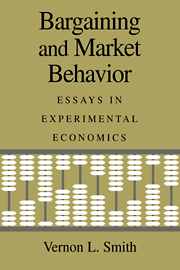Book contents
- Frontmatter
- Contents
- Preface
- Part I Economics and Psychology
- INTRODUCTION
- 1 Rational Choice: The Contrast Between Economics and Psychology
- 2 Experimental Tests of the Endowment Effect
- 3 Monetary Rewards and Decision Cost in Experimental Economics
- 4 Fairness: Effect on Temporary and Equilibrium Prices in Posted-Offer Markets
- Part II Bargaining Theory, Behavior, and Evolutionary Psychology
- Part III Institutions and Markets
- Part IV Stock Markets and Bubbles in the Laboratory
- References
- Index
INTRODUCTION
Published online by Cambridge University Press: 29 October 2009
- Frontmatter
- Contents
- Preface
- Part I Economics and Psychology
- INTRODUCTION
- 1 Rational Choice: The Contrast Between Economics and Psychology
- 2 Experimental Tests of the Endowment Effect
- 3 Monetary Rewards and Decision Cost in Experimental Economics
- 4 Fairness: Effect on Temporary and Equilibrium Prices in Posted-Offer Markets
- Part II Bargaining Theory, Behavior, and Evolutionary Psychology
- Part III Institutions and Markets
- Part IV Stock Markets and Bubbles in the Laboratory
- References
- Index
Summary
Economic theorists and cognitive (decision behavior) psychologists agree on several core (maintained) hypotheses about human decision making: (1) rationality in social and economic contexts derives directly from the rationality of individual decision makers – if surveys of isolated individuals indicate irrational responses, ipso facto, markets and other group interaction decision systems will be irrational; (2) individual rationality is a self-aware cognitive process – if people get things right, it is through thinking about and understanding the processes in which they partake; and (3) the human mind is modeled as a general purpose problem-solving machine that governs reasoning, learning, memory, and decision making with “no features specialized for processing particular kinds of content” (Gigerenzer, 1996, p. 329). Thus, the economist's model of decision making is expected utility maximization in all decision making under uncertainty. Kahneman and Tversky's (1979) model is maximization of a weighted value function that modifies the objective probabilities (judgments) and utilities of expected utility theory to descriptively account for decision making under uncertainty.
The work of experimental economists has focused more explicitly on the behavior of markets and other interactive rule-governed institutional mechanisms in which individual decision making is not isolated from that of others. This perspective has generated methodological differences between experimental economics and cognitive psychology that have led to a divergence in the questions asked and the research procedures used.
The chapters in Part I address some of these issues in detail. One issue is whether the research results of cognitive psychologists are robust with respect to behavior in markets, to substantial monetary rewards, and to institutional context, although the last potentially overlaps the study of “framing” effects in psychology.
- Type
- Chapter
- Information
- Bargaining and Market BehaviorEssays in Experimental Economics, pp. 3 - 6Publisher: Cambridge University PressPrint publication year: 2000



